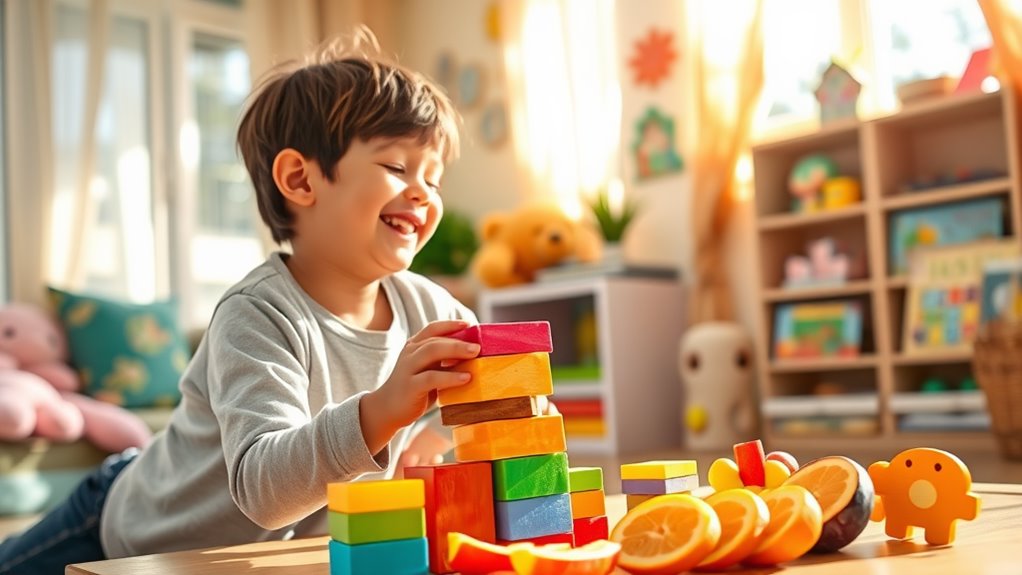Child Health and Development Tips You Can’t Ignore!
To boost your child’s health and development, start with balanced nutrition. Ensure their meals include leafy greens, whole grains, and lean proteins. Regular physical activity is crucial too—limit screen time and encourage outdoor play to keep them active and engaged. Promote mental wellness through open communication and emotional support. Be aware of developmental milestones to track their growth and provide constructive feedback. Lastly, establish consistent sleep habits to enhance overall well-being. By nurturing social connections and practicing positive parenting, you can create a supportive environment. Discover more practical tips to guide you on this rewarding journey.
Key Takeaways
- Prioritize balanced nutrition by including a variety of nutrient-dense foods to support your child’s growth and development.
- Encourage regular physical activity through outdoor play and family involvement to establish lifelong fitness habits.
- Foster emotional intelligence by practicing open communication and active listening to validate your child’s feelings.
- Monitor developmental milestones to ensure your child’s growth is on track and address any concerns promptly.
- Promote social connections through playdates and group activities to enhance social skills and emotional well-being.
Importance of Balanced Nutrition
Balanced nutrition is the cornerstone of healthy child development. When you focus on providing nutrient-dense foods, you’re laying the groundwork for your child’s growth, learning, and overall well-being. These foods, rich in vitamins, minerals, and healthy fats, fuel their bodies and brains. Think leafy greens, whole grains, lean proteins, and healthy fats like avocados and nuts.
Healthy meal planning is essential in this process. By planning meals ahead, you ensure your child has access to a variety of foods that meet their nutritional needs. Start by creating a weekly menu, incorporating different colors and textures to make meals appealing. This not only encourages your child to try new foods but also helps develop lifelong healthy eating habits.
Don’t forget to involve your child in the planning and preparation. This engagement can spark their interest in nutrition and teach them about making healthy choices. Remember, balanced nutrition isn’t just about what they eat today; it’s about building a foundation for a healthier future. So, take charge of their nutrition, and you’ll see the positive impact on their growth and development.
Encouraging Regular Physical Activity
Physical activity is essential for your child’s growth and development, impacting everything from their physical health to their mental well-being. To encourage regular physical activity, incorporate outdoor games and active play into your family’s routine. Not only does this foster a love for movement, but it also allows your child to explore their environment, develop coordination, and build social skills.
Set aside time each day for outdoor activities, like cycling, playing tag, or kicking a soccer ball. These activities don’t just keep your child fit; they also enhance their cognitive abilities and emotional resilience. Make it a family affair—join in on the fun! When you actively participate, your enthusiasm will inspire your child to engage more.
Limit screen time and replace it with opportunities for active play. Create a game schedule or set challenges, like a scavenger hunt, to keep things fresh and exciting. Remember, consistency is key. By integrating physical activity into your daily life, you’re laying the groundwork for lifelong healthy habits. Ultimately, you’re nurturing a happy, active child ready to tackle life’s challenges with confidence and vigor.
Promoting Mental Wellness
Promoting mental wellness in your child starts with encouraging open communication, so they feel safe sharing their thoughts and feelings. Fostering emotional intelligence helps them understand and manage their emotions effectively, which is crucial for their overall well-being. Additionally, incorporating mindfulness practices into their routine can enhance their focus and reduce anxiety, supporting a healthier mindset.
Encourage Open Communication
Fostering an environment of open communication is essential for your child’s mental wellness. When your child feels comfortable sharing thoughts and feelings, it promotes trust and understanding. Start by practicing active listening; give them your full attention, and show you value their words. This not only boosts their confidence but also reinforces the importance of expressing themselves.
Encourage your child to use expressive language. You can achieve this by asking open-ended questions that invite deeper conversations. Instead of “Did you have a good day?” try “What was the best part of your day?” This approach encourages them to articulate their thoughts and feelings more vividly.
Be mindful of your responses. Affirm their emotions, even if you don’t fully understand. A simple “I see this is really important to you” can help them feel validated. Moreover, share your own experiences and emotions, which models healthy communication habits.
Foster Emotional Intelligence
Developing emotional intelligence in your child is crucial for their overall mental wellness. By fostering emotional expression, you empower them to articulate their feelings rather than suppress them. Encourage your child to identify and name their emotions—this simple practice lays the groundwork for deeper emotional understanding.
To promote empathy development, engage your child in conversations about feelings. Ask them how they think others might feel in various situations. This not only sharpens their ability to empathize but also helps them appreciate diverse perspectives. Role-playing can be an effective tool; it allows your child to explore different emotional scenarios in a safe environment.
Modeling emotional intelligence yourself is vital. When you openly express your feelings and navigate conflicts with empathy, you set a powerful example. Remember, it’s okay to show vulnerability; it teaches your child that everyone experiences a range of emotions.
Lastly, create a supportive atmosphere where emotions are validated. Acknowledging your child’s feelings, even when you disagree, builds their emotional resilience and fosters a strong sense of self. By investing time in these practices, you’ll equip your child with the emotional tools necessary for navigating life’s challenges.
Promote Mindfulness Practices
While it might seem challenging to incorporate mindfulness into your child’s daily routine, doing so can significantly enhance their mental wellness. Start by introducing mindfulness meditation, which can be as simple as setting aside five minutes each day for quiet reflection. Encourage your child to sit comfortably, close their eyes, and focus on their breath. This practice not only promotes relaxation but also helps develop concentration skills.
Additionally, you can integrate breathing exercises into your routine. Teach your child to take deep breaths in and out, counting to four for each inhale and exhale. This technique helps them manage anxiety and stress, providing them with tools to navigate challenging emotions.
Make mindfulness a family activity. You could practice together, fostering a supportive environment where everyone feels comfortable expressing their thoughts and feelings. Consider using guided meditation apps designed for kids; these can make the experience engaging and accessible.
Understanding Developmental Milestones
Understanding your child’s developmental milestones is crucial for tracking their growth and ensuring they reach their full potential. By keeping an eye on these milestones, you can identify when a developmental assessment might be necessary. Here are three key areas to monitor:
-
Physical Development: Observe your child’s motor skills, such as crawling, walking, and coordination. These abilities are foundational for future activities.
-
Cognitive Development: Pay attention to problem-solving skills and how they interact with their environment. This includes recognizing shapes, colors, and understanding cause and effect.
-
Social and Emotional Development: Watch how your child interacts with others. Are they forming attachments? Do they express feelings appropriately?
Building Healthy Sleep Habits
Creating healthy sleep habits for your child starts with establishing a consistent bedtime routine. This routine not only signalizes to your little one that it’s time to wind down, but also helps them feel secure and relaxed. Additionally, paying attention to the sleep environment can significantly impact how well they rest, so consider factors like light, noise, and comfort.
Establishing a Routine
Establishing a consistent bedtime routine can significantly improve your child’s sleep quality and overall well-being. A well-structured routine helps your child understand when it’s time to wind down, making the transition from day to night smoother. Here are three practical steps you can implement:
-
Set a Regular Bedtime: Choose a bedtime that works for your family and stick to it. Consistency reinforces your child’s internal clock and makes falling asleep easier.
-
Create Evening Wind Downs: Incorporate calming activities into your routine, such as reading a story, gentle stretching, or listening to soft music. These activities signal to your child that it’s time to relax and prepare for sleep.
-
Incorporate Morning Rituals: Don’t forget about the start of the day! Establish morning rituals that promote positivity and set the tone for a productive day. This can help balance the structure needed for effective evening wind downs.
Sleep Environment Importance
A comfortable sleep environment can dramatically influence your child’s ability to fall and stay asleep. Start by ensuring their bedroom is a serene and cozy space, free from distractions. This means a comfortable mattress and proper bedding that suits their preferences. It’s crucial to maintain a cool room temperature; studies show that cooler environments promote better sleep quality.
Next, consider noise reduction. Even subtle sounds can disrupt sleep cycles, so aim for a quiet atmosphere. Use white noise machines or soft music to mask disruptive sounds, creating a soothing auditory backdrop. Heavy curtains can also block outside noise and light, further enhancing their sleep environment.
Additionally, limit screen time before bed. The blue light emitted by devices can interfere with melatonin production, making it harder for your child to drift off. Instead, encourage calming activities like reading or storytelling.
Fostering Social Connections
Strong social connections play a crucial role in your child’s overall health and development. Fostering these connections isn’t just about making friends; it’s about building vital social skills that will benefit your child throughout life. By encouraging peer interactions, you help your child learn empathy, cooperation, and effective communication.
Here are three practical ways to foster social connections:
-
Organize Playdates: Regular playdates with peers give your child the chance to practice their social skills in a safe environment. Choose activities that encourage teamwork, such as building projects or group games.
-
Enroll in Group Activities: Whether it’s sports, music, or art, group activities provide structured opportunities for your child to interact with others. This exposure helps develop their ability to work with different personalities.
-
Model Positive Social Behavior: Children often mimic adults. Demonstrate empathy, active listening, and conflict resolution in your interactions. Your example will guide them in navigating their own peer interactions.
Engaging in Positive Parenting
Positive parenting is all about creating a nurturing environment where your child can thrive. When you engage in positive parenting, you focus on building a strong, trusting relationship with your child. This involves using positive reinforcement to encourage desirable behaviors instead of solely punishing negative actions. By acknowledging and rewarding good behavior, you help your child feel valued and understood.
To foster this nurturing environment, set clear expectations and offer consistent support. Engage in open conversations, allowing your child to express their feelings and thoughts. This not only bolsters their self-esteem but also teaches them the importance of communication.
It’s essential to model the behavior you want to see. Show empathy, patience, and kindness in your interactions, and your child will learn to mirror these qualities. Celebrate their successes, no matter how small, and provide constructive feedback when they face challenges.
Frequently Asked Questions
How Can I Identify if My Child Is a Picky Eater?
If your child’s plate resembles a rainbow with only a few colors, they might be a picky eater. Observe their food preferences, and adopt meal strategies that gently introduce variety to expand their palate.
What Are Signs of Emotional Distress in Children?
To spot signs of emotional distress in children, watch for behavioral changes, emotional outbursts, social withdrawal, and sleep disturbances. These indicators can help you understand their feelings and provide the support they need.
How Much Screen Time Is Considered Too Much?
You should follow screen time guidelines, limiting recreational use to one hour daily for children aged 2-5. Excessive screen time can negatively impact development, affecting attention spans, social skills, and overall well-being.
When Should I Start Teaching My Child About Money?
You should start teaching your child about money management as early as age five. Introduce saving habits through fun activities, like setting savings goals for toys, fostering a practical understanding of money’s value and purpose.
How Can I Improve My Child’s Concentration for Studying?
Imagine your child, Sarah, struggling to concentrate on her math homework. By creating a distraction-free study environment and using focus techniques like the Pomodoro method, you can significantly enhance her ability to focus and succeed.




